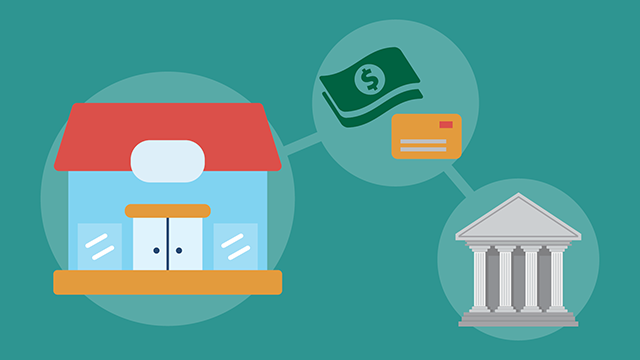Learn strategic ways to manage your finances with Cash Loans
A Comprehensive Overview to Home Loans: Provider and Options Explained
Charting the globe of home mortgage can be intricate. Various choices exist, each with special functions and implications for prospective house owners. Comprehending the distinctions between standard and government-backed fundings is necessary. Moreover, the application procedure entails precise documentation and pre-approval actions that many forget. As consumers commence on their home-buying journey, knowing just how to manage these responsibilities successfully could indicate the distinction between monetary stability and difficulty. What approaches can equip them on this course?
Understanding Home Loans: Kinds and Terms
Comprehending the numerous kinds of home fundings and their connected terms is crucial for possible house owners, as it furnishes them with the expertise needed to make informed monetary decisions. Home lendings can be extensively categorized right into adjustable-rate and fixed-rate home loans. Fixed-rate home loans keep a regular interest price over the life of the car loan, providing security in monthly repayments. Fast Cash. Conversely, variable-rate mortgages feature rate of interest that might rise and fall after an initial fixed period, potentially causing lower first repayments however increased future prices
Added terminology is very important for clarity. Principal refers to the lending amount obtained, while rate of interest is the cost of loaning that quantity. The term of the finance shows its period, usually ranging from 15 to thirty years. Recognizing these fundamental principles makes it possible for potential buyers to browse the complicated landscape of home funding, guaranteeing they select the appropriate finance alternative that straightens with their monetary scenario and long-lasting objectives.
Traditional Fundings vs. Government-Backed Loans
A significant distinction in home financing exists between standard car loans and government-backed lendings, each accommodating different consumer demands and conditions. Conventional finances are not guaranteed or ensured by the federal government and normally need greater credit scores and deposits. They are often attracting borrowers with steady monetary histories, as they may use competitive rate of interest and terms.
In contrast, government-backed financings, such as FHA, VA, and USDA lendings, are made to help specific groups of borrowers, consisting of novice buyers and veterans. Cash Loans. These lendings generally feature lower deposit demands and more flexible credit scores requirements, making them obtainable to a broader variety of people
Inevitably, the selection in between government-backed and conventional loans depends upon the customer's monetary situation, lasting objectives, and eligibility, making it necessary to thoroughly assess both alternatives before choosing.

The Role of Rate Of Interest in Home Funding
Rates of interest play a crucial function in home financing, influencing consumers' choices between fixed and variable rate finances. The selection between these choices can substantially impact month-to-month repayments, influencing total affordability. Comprehending exactly how rate of interest prices work is necessary for any person steering with the mortgage procedure.
Taken Care Of vs. Variable Rates
Homebuyers encounter a crucial decision when picking between dealt with and variable rates, as this choice greatly influences the expense of financing with time. Fixed-rate home loans provide stability, locking in a rates of interest for the life of the funding, which can be useful in an increasing rates of interest environment. This predictability allows homeowners to spending plan better. Alternatively, variable-rate mortgages, or variable-rate mortgages (ARMs), normally begin with reduced preliminary prices that can rise and fall based on market problems. While this may lead to lower initial settlements, customers encounter the risk of boosted rates in the future. Ultimately, the selection between fixed and variable rates depends upon private financial situations, danger resistance, and assumptions regarding future rates of interest fads.
Effect On Month-to-month Payments
When examining home financing alternatives, the impact of interest rates on month-to-month repayments is a crucial factor to consider. Rates of interest directly affect the general expense of loaning, influencing exactly how a lot a consumer will pay monthly. A lower rates of interest cause smaller sized regular monthly settlements, making homeownership a lot more affordable. Conversely, greater prices can significantly increase month-to-month responsibilities, possibly stressing a homeowner's budget plan. Furthermore, the financing term plays a vital function; longer terms may spread settlements out yet can result in paying more interest with time. Understanding how rate of interest rates interact with financing amounts and terms is vital for borrowers to make informed monetary choices and select a home mortgage that lines up with their long-term monetary goals.
Mortgage Brokers vs. Straight Lenders: Which Is Right for You?
When thinking about a mortgage, possible consumers have to understand the distinct functions and duties of home mortgage brokers and straight loan providers. Each choice provides its look at this now very own advantages and downsides, which can considerably influence the total expense of funding. An enlightened selection needs careful evaluation of these variables to establish the most effective suitable for specific requirements.
Duties and roles Defined
Maneuvering the complexities of home Homepage funding requires a clear understanding of the roles and responsibilities of home mortgage brokers and direct lending institutions. Mortgage brokers work as middlemans, attaching consumers with lenders. They examine a borrower's monetary scenario, curate lending options, and guide clients with the application process, usually leveraging numerous lending institution partnerships to secure desirable terms. Alternatively, straight lending institutions, such as financial institutions and lending institution, supply financings directly to borrowers. They take care of the whole financing procedure, from application to financing, with a focus on their very own items. Each option presents unique opportunities for getting financing, making it necessary for customers to assess their requirements and preferences when deciding in between involving a mortgage broker or functioning with a direct loan provider.
Pros and Disadvantages Contrast
Selecting in between a mortgage broker and a straight lender can significantly influence the home financing experience, as each option offers distinct advantages and disadvantages. Mortgage brokers function as intermediaries, offering access to several loan providers and possibly better prices, while streamlining the funding procedure. They might charge fees and depend on commission frameworks that can affect their referrals. On the various other hand, straight loan providers improve the process by supplying in-house lendings, which can cause faster approvals and less difficulties. On the other hand, they may have a restricted choice of items and less adaptability relating to pricing. Eventually, the choice pivots on private preferences, financial situations, and the preferred degree of assistance throughout the mortgage trip.
Price Ramifications Examined
While reviewing the cost effects of home loan brokers versus direct lenders, potential homeowners need to take into consideration various aspects that can significantly influence their general expenditures. Home loan brokers typically charge fees for their solutions, which can differ significantly, affecting the overall car loan expense. Nonetheless, they often have access to a larger variety of funding products and competitive prices, possibly saving debtors cash over time. Conversely, direct lenders might offer a more straightforward procedure with possibly reduced upfront expenses, however their lending choices may be limited. It is essential for property owners to compare rate of interest, fees, and terms from both brokers and loan providers, ensuring they make an educated choice that lines up with their monetary goals and demands.
The Mortgage Application Process: What to Expect

The mortgage application process can usually really feel intimidating for lots of candidates. It usually starts with collecting required paperwork, including proof of income, credit scores background, and individual recognition. Lenders utilize this information to analyze the candidate's monetary stability and figure out car loan qualification.
Next, candidates submit a formal application, which might entail filling in on-line kinds or giving information face to face. Throughout this stage, lending institutions review numerous factors, such as debt-to-income ratio and credit scores rating, to pick finance terms.
As soon as pre-approved, the lender will perform a complete evaluation of the property to ascertain its worth lines up with the loan quantity. This phase may likewise include extra background checks.

After last authorizations and problems are fulfilled, the lending is processed, leading to the closing phase. Recognizing each action equips candidates, making the trip smoother and a lot more workable as they approach homeownership.
Tips for Handling Your Mortgage Sensibly
Successfully maneuvering the home loan application process is simply the beginning of a responsible financial trip. Taking care of a home mortgage calls for focus to numerous crucial methods. Borrowers need to develop a clear spending plan that fits regular monthly mortgage payments, residential property taxes, and insurance. Frequently evaluating this budget helps stop overspending and assurances timely payments.
Additionally, making extra payments when feasible can substantially decrease the lending principal and complete rate of interest paid in time. Consumers ought to additionally maintain open lines of interaction with their loan provider, specifically in times of financial problem. This can result in possible services such as lending alterations or refinancing choices.
Finally, it is a good idea to check credit score scores regularly. A great credit report can offer chances for much better car loan terms in the future. Cash Loans. By adhering to these pointers, home owners can browse their car loan obligations properly, guaranteeing long-lasting monetary health and wellness and security
Often Asked Concerns
What Are Closing Expenses and Exactly How Are They Computed?
Closing costs here include charges connected with completing a mortgage, including evaluation, title insurance coverage, and loan source costs. These prices typically vary from 2% to 5% of the financing amount, varying based on location and lender.
Can I Get Approved For a Home Mortgage With Bad Debt?
Yes, individuals with negative credit score can certify for a home mortgage, though alternatives might be limited. Lenders frequently need higher down repayments or passion prices, and discovering government-backed fundings may enhance opportunities of authorization.
What Is Home mortgage Insurance policy and When Is It Called for?
Home loan insurance policy secures loan providers against default and is commonly needed when a customer makes a deposit of much less than 20%. It guarantees that lenders recuperate losses if the consumer stops working to settle the financing.
Exactly How Does Refinancing Work and When Should I Consider It?
Refinancing includes changing a present mortgage with a brand-new one, normally to secure a lower rate of interest or change loan terms. House owners should consider refinancing when interest prices go down considerably or their monetary scenario boosts.
What Happens if I Miss a Mortgage Settlement?
If a home loan repayment is missed, the lender typically analyzes late fees, reports the delinquency to credit report bureaus, and may start repossession process if payments remain to be disregarded, ultimately threatening the property owner's residential or commercial property.
Fixed-rate home loans keep a regular interest rate over the life of the lending, giving security in month-to-month settlements. A considerable difference in home financing exists in between government-backed car loans and conventional finances, each catering to various customer demands and conditions. In contrast, government-backed financings, such as FHA, VA, and USDA loans, are designed to aid certain groups of consumers, consisting of newbie property buyers and professionals. Passion prices play a crucial function in home financing, affecting debtors' decisions in between variable and set rate fundings. Fixed-rate home loans offer stability, locking in an interest price for the life of the lending, which can be beneficial in a rising passion rate setting.